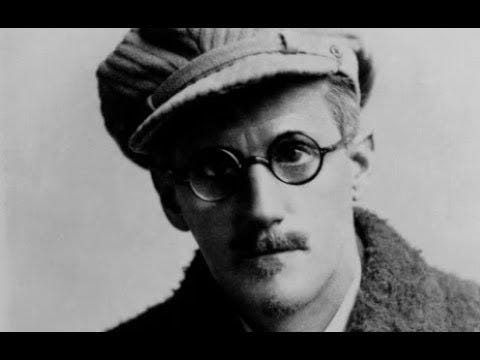The Joy of James Joyce
Here are four reasons why I'm going to dig into the life and work of the 20th century's greatest novelist.
OK, so you can blame
for this. It's his fault; I will not take personal responsibility for my actions here, as this is, of course, the way of the world these days. So go complain to him if you can’t handle this can we’re cracking open and serving here.Last week, Thomas revealed that James Joyce's final book, Finnegans Wake - which also happens to be his most infamous and difficult book - was available on Audible for $8. I immediately jumped on this because I'd heard that the only way to really tackle the mysteries of the Wake is to hear it read aloud.
Since buying it, I've started a new nighttime routine. Rather than falling asleep to some YouTube lecture on Hermeticism, Kabbalah, Pythagoras, the Bronze Age, or the historical Jesus, now I'm drifting to sleep with this bizarre book - which is, itself, about dreaming. I figured that perhaps this is the real way to take it in, while one is in that hypnagogic state in which ideas can seep into one's dreams.
And, oh man, is it wonderful.
(Editor’s Note: Objection! Assuming facts not in evidence. The occupants of this house are not all equally thrilled with this new nighttime routine. Two weeks ago, I'd have laughed if you'd told me that I, who flunked algebra not once but twice, would soon miss the bedtime Pythagoras lectures, but alas, here we are. -SS)
The richness and playfulness of the language, the jumps and allusions and jokes—it's just great, so much easier than trying to read the damn thing.
So as a result, I'm taking this as an excuse—along with needing to create compelling content for this new Substack—to really dive into Joyce fully, revisiting Dubliners, A Portrait of the Artist as a Young Man, and of course, Ulysses, what I regard as the greatest novel ever written. Joyce also has a play, Exiles, and a poetry collection, Chamber Music, which I’ll consider for the first time.
To this end, I'll also republish Dubliners and A Portrait of the Artist on this Substack. Both are now in the public domain. (In fact, if you go to our About Us page, you’ll see Joyce already listed as a contributor.) And while the early edition of Ulysses is available in the public domain, too, more recent editions are much better.
I'll also explore the Joyce scholarship out there, seeing how the field has advanced in the 20 years since my undergraduate days when I first fell head over heels for this British modernist period.
And there will certainly be an embarrassment of riches on YouTube here, including audiobook performances of many of his texts, and, I suspect, lectures, debates, and discussions.
“Why this focus on Joyce?” some who have not read him yet may be asking. “What practical benefits are to be gained here?”
1. The language and literary style employed by Joyce is melt-into-a-puddle-on-the-floor good. I'm hoping that, by taking in a heavy dosage of Joyce, some of his great writing can seep into my own.
2. Ulysses is the novel that comes closest to what the Bible accomplishes. It is a text packed to the brim that one can read and reread and study endlessly. The more one learns, the more layers the text reveals.
3. Joyce was notoriously challenged with all sorts of health problems that impeded his writing, yet he still managed to become the most significant novelist of all time. As one who has also struggled with health problems impeding my writing, I want to learn more about how he did it. What were Joyce's methods and approaches for doing the writing that he did? What can we as writers learn here?
4. This seems like a great gateway into exploring my Irish heritage. I never knew until recently that the Swindles could be traced back to the UK. We had always heard growing up that our heritage was German, since it was known that our ancestors were at the Germanna colony in Virginia during the early 1700s. It's only through the last few years of genealogy research that I've learned that our Swindle ancestor at this colony was actually English: his wife was German.
According to 23andMe, the largest chunk of our family's DNA goes back to the Northern Ireland and Central Scottish Lowlands region. I've even found a location in Cumbria with the family name: Swindale Valley. Apparently the surname “Swindle” breaks down into the separate words "Swine" and "Dale," meaning a valley where pigs are raised.
So it's time to learn a bit better about the culture where my family emerged.
I hope this all sounds like fun, both to those who have never explored Joyce and also for those of you who know a WHOLE LOT MORE than I do.
Please join us!




